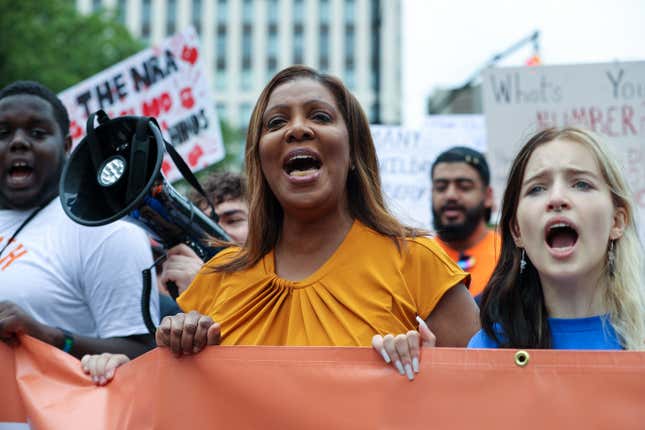
Democratic attorneys general are not taking the latest GOP attack on diversity programs lying down. This week, a group of Democratic AGs pushed back on claims from their counterparts across the aisle that the Supreme Court’s affirmative action decision impacted hiring practices at private companies.
According to NBC News, on a call, the attorneys general of New York, Illinois, Nevada, and four other states said that company DEI programs are still legal. They also pushed back on claims that companies were using race-based quotas.
“There is no corporation I’m aware of that promotes quotas or openly discriminates based on a number,” New York Attorney General Letitia James said, according to NBC.
The call came in response to a letter sent by 13 Republican attorneys general to Fortune 100 companies arguing that the Supreme Court decision gutting affirmative action in higher education applied to hiring practices.
The Root spoke to experts last week, who warned that the letter was a “scare tactic;”
Amalea Smirniotopoulos, NAACP Legal Defense Fund Senior Policy Counsel, says that these Republican attorneys general are trying to make the Supreme Court’s affirmative decision about something it’s not.
“This was another attempt to chill completely lawful efforts to increase diversity, equity, and inclusion by corporations,” says Smirniotopoulos. “By really trying to stretch the meaning of the decision in the Harvard and UNC cases and frankly by also restating things that have always been true about discrimination law and employment.”
Legal experts, including Justin Hansford, Executive Director of the Thurgood Marshall Civil Rights Center at Howard University, expressed concerns that companies could use this as an opportunity to pull back efforts at promoting diversity:
“Some of these companies weren’t really doing that much anyway... and what they were doing was done only under pressure,” says Hansford. “This could be an excuse for some companies that already didn’t want to push the envelope on diversity to start walking things back.”
On the flip side, Smirniotopoulos warned that companies that try to roll back diversity programs could also find themselves in trouble under the Civil Rights Act. Now that both sides of the aisle have provided guidance on the Supreme Court decision, we’ll have to wait and see how companies respond.

